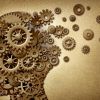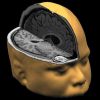-
 +15 +1
+15 +1Close friends linked to a sharper memory
Maintaining positive, warm and trusting friendships might be the key to a slower decline in memory and cognitive functioning, according to a new Northwestern Medicine study. SuperAgers -- who are 80 years of age and older who have cognitive ability at least as good as people in their 50s or 60s -- reported having more satisfying, high-quality relationships compared to their cognitively average, same-age peers, the study reports.
-
 +22 +1
+22 +1The Real Link Between Creativity and Mental Illness
“There is only one difference between a madman and me. I am not mad.” — Salvador Dali. The romantic notion that mental illness and creativity are linked is so prominent in the public consciousness that it is rarely challenged. So before I continue, let me nip this in the bud: Mental illness is neither necessary nor sufficient for creativity.
-
 +1 +1
+1 +1A Harvard philosopher’s argument for not loving yourself just as you are
The importance of loving yourself is a common catchphrase among feel-good gurus and the subject of countless self-help books. But Harvard University’s Michael Puett argues that loving yourself—and all your flaws—can actually be quite harmful. Puett, who earlier this year published a book on what Chinese philosophy can teach us about the good life, suggests that ancient Chinese philosophers would strongly disapprove of today’s penchant for self-affirmation.
-
 +29 +1
+29 +1Study finds reading information aloud to yourself improves memory
You are more likely to remember something if you read it out loud, a study from the University of Waterloo has found. A recent Waterloo study found that speaking text aloud helps to get words into long-term memory. Dubbed the “production effect,” the study determined that it is the dual action of speaking and hearing oneself that has the most beneficial impact on memory.
-
 +2 +1
+2 +1The Limits of Logic
Logicians don't rule the world or get the most done. Could it be that a consistent world view is neither desirable nor achievable? If we abandon the straightjacket of rationality might this lead to a more powerful and exciting future, or is it a heresy that leads to madness?
-
 +19 +1
+19 +1We view ourselves and those we care about through ‘rose-tinted glasses’, study says
New research from City, University of London, University of Oxford and Yale University has shown that we see our own lives, and also those we care about, through ‘rose-tinted glasses’. The study, which is the first to show that such an ‘optimism bias’ extends beyond the self, found that people readily changed their beliefs about a person they like when receiving good news but barely changed their opinions about them after receiving bad news.
-
 +20 +1
+20 +1A philosopher’s 350-year-old trick to get people to change their minds is now backed up by psychologists
The 17th century philosopher Blaise Pascal is perhaps best known for Pascal’s Wager which, in the first formal use of decision theory, argued that believing in God is the most pragmatic decision. But it seems the French thinker also had a knack for psychology. As Brain Pickings points out, Pascal set out the most effective way to get someone to change their mind, centuries before there was any formal study of persuasion...
-
 +17 +1
+17 +1Poverty Impedes Cognitive Function
Lacking money or time can lead one to make poorer decisions, possibly because poverty imposes a cognitive load that saps attention and reduces effort. Mani et al. (p. 976; see the Perspective by Vohs) gathered evidence from shoppers in a New Jersey mall and from farmers in Tamil Nadu, India. They found that considering a projected financial decision, such as how to pay for a car repair, affects people's performance on unrelated spatial and reasoning tasks.
-
 +2 +1
+2 +1New study shows musicians have a remarkable behavioral advantage when it comes to learning
"Currently, there is striking evidence showing that both plastic changes in the auditory-related cortex (ARC), as well as altered neural network characteristics, lead to remarkable behavioral advantages of musicians..." Says Stefan Elmer - Lead author of the study, 'Theta Coherence Asymmetry in the Dorsal Stream of Musicians Facilitates Word Learning' published in Nature on 15th March 2018
-
 +20 +1
+20 +1Brain activity study links social anxiety to a preoccupation with making errors
A new study that monitored children’s brain activity suggests that social anxiety is related to a preoccupation with making mistakes. The research, published in the Journal of the American Academy of Child & Adolescent Psychiatry, provides insight into the neurological mechanisms underlying social anxiety symptoms.
-
 +13 +1
+13 +1Theoretically, Recording Dreams Is Possible...Scientists Are Trying
Dreams can feel awfully real when you’re deep in sleep. Perhaps you find a hidden doorway in your home that leads to entirely new rooms and passageways. Maybe you went to work in your underwear—yikes. When you wake up, you check your closet for that mysterious doorway; maybe you jolt awake in a cold sweat, instantly relieved you still have plenty of time to properly clothe yourself before leaving the house. Regardless, whatever you were experiencing felt very real just moments ago.
-
 +7 +1
+7 +1Why Psychopaths Make Such Bad First Impressions
When you meet someone for the first time, your mind actively turns on the assessment machinery to help gauge whether this is a person you can trust or not. You try to evaluate whether this person will have your best interests at heart, or whether you’re at risk of having this person take advantage of you. If you’re good at this skill, you’ll easily be able to figure out what your approach should be and react accordingly. If not, you stand to lose anything from your hard-earned money to a chunk of your well-being.
-
 +22 +1
+22 +1Attentive adults increase children’s ability to empathise
For human beings to function socially, they need to be able to perceive, understand, and talk about others’ mental states, such as beliefs, desires and intentions. There is no consensus among researchers as to when children develop this ability. Previous research indicates that it emerges around the age of four, but research at Lund University in Sweden shows that children can demonstrate this ability earlier – within social situations that they experience together with an engaged adult.
-
 +12 +1
+12 +1In Virtual Reality, How Much Body Do You Need?
How connected are your body and your consciousness? When Michiteru Kitazaki, a professor of engineering at Toyohashi University of Technology in Japan, recently posed this question in an email, he evoked an idea from Japanese culture known as tamashii, or the soul without a body.
-
 +21 +1
+21 +1The Overkill Backfire Effect: on the Danger of Having Too Much Evidence
The overkill backfire effect is a cognitive bias that causes people to reject arguments that they think are too complex, in favor of arguments that are easy for them to understand. Accounting for this bias is important, because it means that past a certain point, presenting additional evidence in support of your argument can actually make people less likely to accept it.
-
 +11 +1
+11 +1People who think their opinions are superior to others are most prone to overestimating their relevant knowledge and ignoring chances to learn more
We all know someone who is convinced their opinion is better than everyone else’s on a topic – perhaps, even, that it is the only correct opinion to have. Maybe, on some topics, you are that person. No psychologist would be surprised that people who are convinced their beliefs are superior think they are better informed than others, but this fact leads to a follow on question: are people actually better informed on the topics for which they are convinced their opinion is superior? This is what Michael Hall and Kaitlin Raimi set out to check in a series of experiments in the Journal of Experimental Social Psychology.
-
 +1 +1
+1 +1Taking a photo of something impairs your memory of it, but the reasons remain largely mysterious
Avid photographers celebrate the viewfinder as a means of helping us see the world anew. But psychology research has shown that under some conditions taking a photo of something actually makes it harder to remember. One possible reason is that we give less attention to an experience when we know that it will be safely stored in a photograph. But in a new paper in the Journal of Applied Research in Memory and Cognition, Julia Soares and Benjamin Storm from the University of California show that the photo-taker’s memory will suffer whether they expect to keep the photo or not.
-
 +5 +1
+5 +1Bad news becomes hysteria in crowds, new research shows
News stories about terrorism, disease outbreaks, natural disasters, and other potential threats become increasingly negative, inaccurate and hysterical when passed from person to person, according to new research by the University of Warwick.
-
 +13 +1
+13 +1Mind wandering is fine in some situations, Harvard-based study says
While most of the psychological literature calls mind wandering a detrimental “failure of executive control” or a “dysfunctional cognitive state,” a new study led by Paul Seli, a Banting Postdoctoral Fellow working in the lab of Dan Schacter, suggests that in some cases there’s no harm in it.
-
 +8 +1
+8 +1Why ‘Find your passion!’ may be bad advice
The belief that interests arrive fully formed and must simply be “found” can lead people to limit their pursuit of new fields and give up when they encounter challenges, according to a new Stanford study.
Submit a link
Start a discussion




















